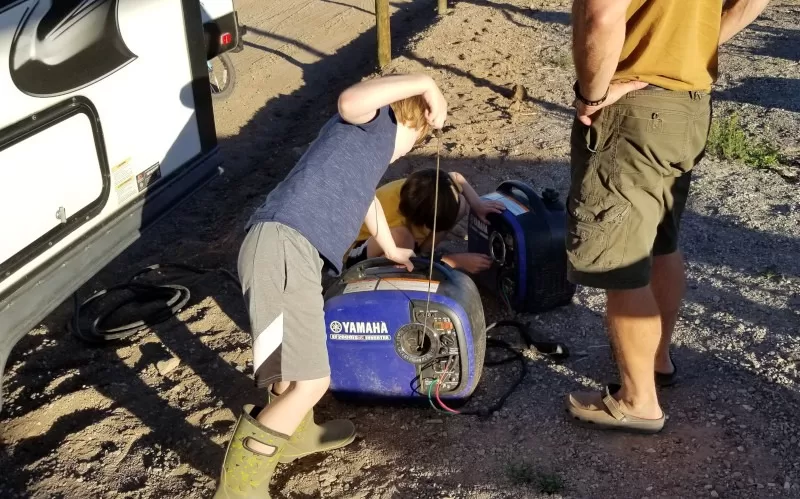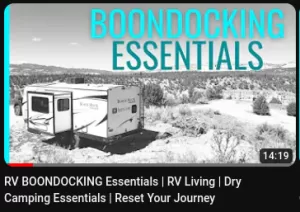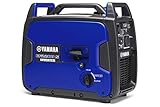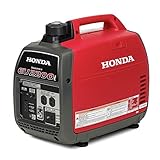Last Updated on 07/22/2024 by Glynn Willard
Dependable Portable RV Generators For Dry Camping
When you’re boondocking in your RV, there’s obviously no shore power.
But do you need a generator to boondock? Technically, no.
Regardless, most of us would like at least some of our creature comforts if we’re boondocking for longer than two nights.
Especially those of us who live full or part-time in an RV and boondock most of the time.
Several factors need to be considered when deciding which portable generator is best for your needs.
- How much power do you need for your kitchen appliances, AC unit, and devices?
- Do you already have solar panels and an inverter for your batteries?
- How much carrying capacity do you have for the additional weight of a generator?
So before you decide on a generator, do your research and learn about:
- The amount of power you need.
- The power draw of your air conditioner and kitchen appliances.
- The electrical system in your RV.
- The type of boondocking you plan on doing (based on boondocking etiquette).
- Your RV’s cargo carrying capacity.
Then you can determine which are the best portable generators for your needs.
Yes, many RV’s come with a built-in generator, but this article is for those of you without one and who require a portable generator for your RV.
And I will only be comparing inverter generators, which supply AC power to appliances and the 120-volt outlets.
I’m using affiliate links and photos to make it easier for you to a) know what I’m talking about and b) help you make an informed decision. We also appreciate the small commission that does not cost you any extra.
What Are Your Electrical Power Needs For RV Camping?
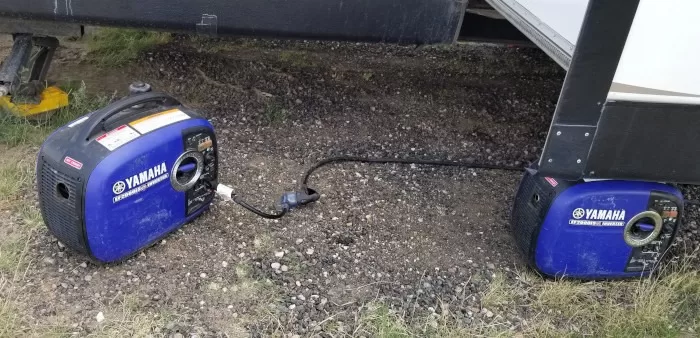
When you’re boondocking in an RV, you will likely want to run your microwave oven and coffee maker, charge your laptop and possibly run your air conditioning.
Make sure you look for a generator with enough power supply to satisfy your creature comforts in the great outdoors.
You’ll need a minimum of 3000 watts of power (starting power) to fire up your air conditioner unless it’s equipped with a soft start.
Most of the popular inverter generators max out around 2200 watts. This is not enough for your microwave or air conditioner.
But if you have two of them, you can buy a parallel kit to run them in parallel.
That will net you 30 amps and enough power to start a 15,000 BTU air conditioner. At least it always worked for us.
This situation works well for 30-amp RVs.
Once you have an idea of your power needs, you can make the best choice for the right generator.
How Much Weight Can You Comfortably Move?

Yamaha generator disassembled for service.
We’re not looking for a massive generator that can power several campers and weighs more than 100 lbs.
The idea is to find the best portable generators. Emphasis on the word portable!
In other words, most people can lift a small generator by themselves.
However, the higher-wattage inverter generators with a lot of power can weigh more than 100 lbs. That’s a lot to move around your boondocking spot!
Consider how much you can easily carry by hand around your campsite.
If you’re limit is around 40lbs, consider running two smaller inverter generators in parallel.
The expense will be higher by purchasing two, but moving them becomes achievable for the average camper.
What Type Of Generator For Boondocking?
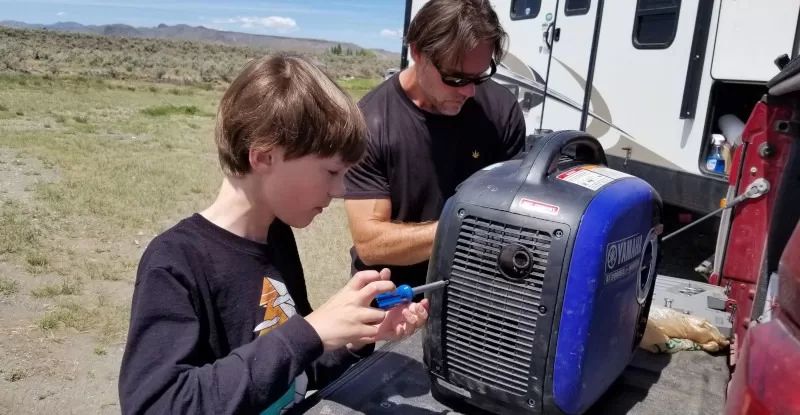
This was a great learning experience for my kids!
There are several types of generators, all of which produce DC current.
I’m only considering generators with an inverter since the only thing you can do with DC current is charge your batteries and run your rig’s DC systems.
Without an inverter, a generator power your outlets or appliances.
The next thing to know is the two types of inverter generators.
-
Open Frame Generator
An open frame generator is what it sounds like, an exposed engine. Picture a construction site.
They’re very powerful generators.
The bottom line, conventional generators are loud.
As far as I’m concerned unless you’re boondocking in a location with no one around, they’re too loud and not the best generator for boondocking.
-
Closed Frame Generator
Typically an inverter generator has a sound-dampening encased engine.
In other words, it will be a quiet generator. This is what you should be shopping for in a boondocking generator.
-
What type of fuel does the generator use?
You can purchase a reliable generator that runs on gasoline, propane or a combination of either.
We prefer gasoline power because it’s more easily attainable at any hour of the day/night.
Also, a propane generator tends to burn through propane very quickly.
Don’t forget, you’ll need a spare propane tank with this option too.
Gasoline inverter generators typically have good fuel efficiency, which is another reason they’re a good option over dual-fuel generators.
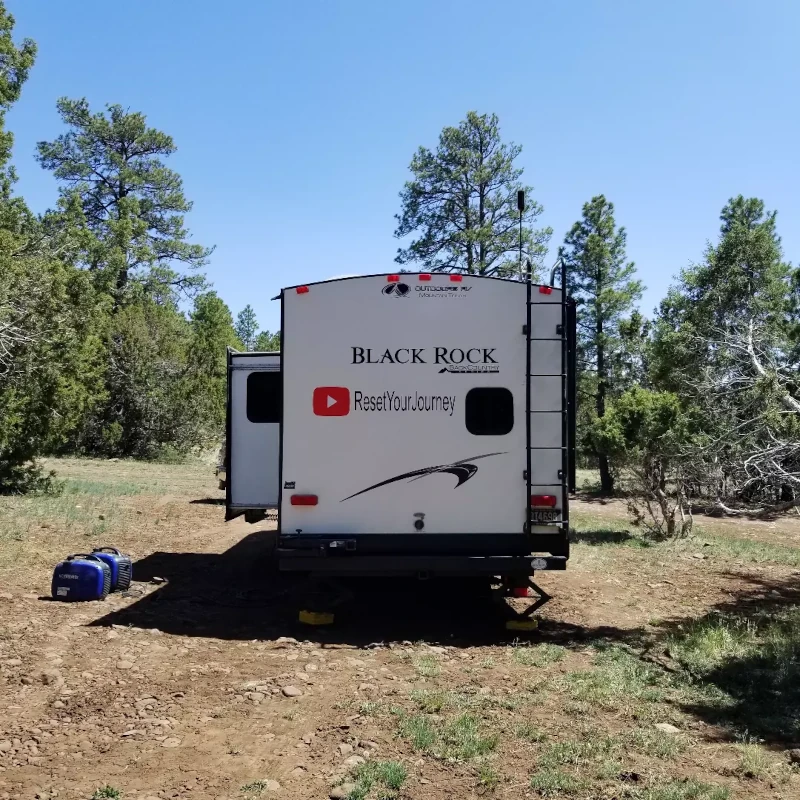
Boondocking Etiquette and Generators
Running any generator when you’re parked right next to another boondocker is just bad ju-ju!
If you’re a good distance away (100-200 yards) or you stay in remote locations, then running a portable generator is fine.
But, when other RV campers are around, be courteous with your noise levels and selective with your timing.
In other words, avoid running your generator early in the morning or late at night.
You have full control of your noise level.
If anyone was ever nearby, we only ran our generators between 9 AM and 10 AM to run the microwave and the heat lamps for our bearded dragon (super cool lizard).
Then we would run them again between 4 PM and 5 PM. Again, for the microwave, heat lamps and recharge the power bank (mentioned later in the article).
If we found ourselves in a location that required air conditioning and no one was around, we would run them intermittently throughout the day.
Otherwise, we would change locations.
We didn’t practice this kind of etiquette initially and likely irritated several boondockers when we first started. Newbie mistake!
It didn’t take us long to figure out how NOT to disturb others.
Oh and please don’t run your portable generator in RV parks.
Do You Have Solar Panels For Your DC Power System?
If you have enough solar power on your roof (or portable solar panels), you will likely not need a generator to run your DC systems.
That includes your light fixtures, water pump, USB ports, the heater fan and a DC-based fridge.
You have a lot of control over how much power you use, allowing you to minimize the tax on the batteries.
We maintained two standard 100 amp hour deep cycle batteries (lead-acid batteries) and 340 watts from our solar panels.
And it was enough to power our DC system indefinitely in sunny environments.
*Note: this does not apply to your AC power system unless you have an onboard inverter.
A Review Of The Best RV Generators (Portable)
All of the smaller generators listed are comparable to one another and are all pull-start.
There are no electric start or remote start options in this list, although they do exist on some of the larger generators.
But many of those larger generators also happen to be loud generators.
Several of the brands also produce 3000-watt generators that are worth considering if you can manage the extra 10-15 lbs.
These are listed in no particular order.
- Yamaha EF 2200iS Inverter Generator
-
Weight:
55.2 lbs
-
Starting power:
2200 watts
-
Power output:
1800 watts
-
Fuel Source:
Gasoline
-
Hours of run time:
10.5 at 1/4 load
-
Noise level (decibals):
57-65 dBA
-
How to start generator:
“Old school” pull start.
- Honda EU 2200i Inverter Generator
-
Dry weight:
47.4 lbs
-
Starting power:
2200 Watts
-
Power output:
1800 Watts
-
Fuel Source:
Gasoline
-
Hours of run time:
8.1 hours at 1/4 load
-
Noise level (decibals):
48-57 dBA
-
How to start generator:
“Old school” pull start.
- Generac 8250 GP2500i Inverter Generator
-
Dry weight:
48 lbs
-
Starting power:
2500 Watts
-
Power output:
2200 Watts
-
Fuel Source:
Gasoline
-
Hours of run time:
8 hours at 1/4 load
-
Noise level (decibels):
Undisclosed
-
How to start generator:
“Old school” pull start.
- Briggs & Stratton P2400 Inverter Generator
-
Dry weight:
50 lbs
-
Starting power:
2400 Watts
-
Power output:
1800 Watts
-
Fuel Source:
Gasoline
-
Hours of run time:
8 hours at 1/4 load
-
Noise level (decibals):
62 dBA
-
How to start generator:
“Old school” pull start.
- Westinghouse iGen 2550DFc Inverter Generator
-
Dry weight:
48.8 lbs
-
Starting power:
2500 watts
-
Power output:
1800 watts
-
Fuel Source:
Gasoline
-
Hours of run time:
12 hours at 1/4 load
-
Noise level (decibals):
52 dBA
-
How to start generator:
“Old school” pull start.
- Champion Power Equipment Dual Fuel Inverter Generator
-
Dry weight:
39 lbs
-
Starting power:
2500 Watts
-
Power output:
1850 Watts (1665 Watts when powered by propane)
-
Fuel Source:
Gasoline or Propane
-
Hours of run time:
11.5 hours at 1/4 load
-
Noise level (decibals):
53 dBA
-
How to start generator:
“Old school” pull start.
I can give you an unequivocal and unbiased review of the Yamaha generator because we have and use two of them for boondocking.
I find them easy to service (oil changes), easy to start, light on fuel consumption, lightweight, quiet and reliable.
Any issues I’ve had with them have been repairable with some minor DIY skills.
That’s important when you’re boondocking in remote locations and need a reliable power source.
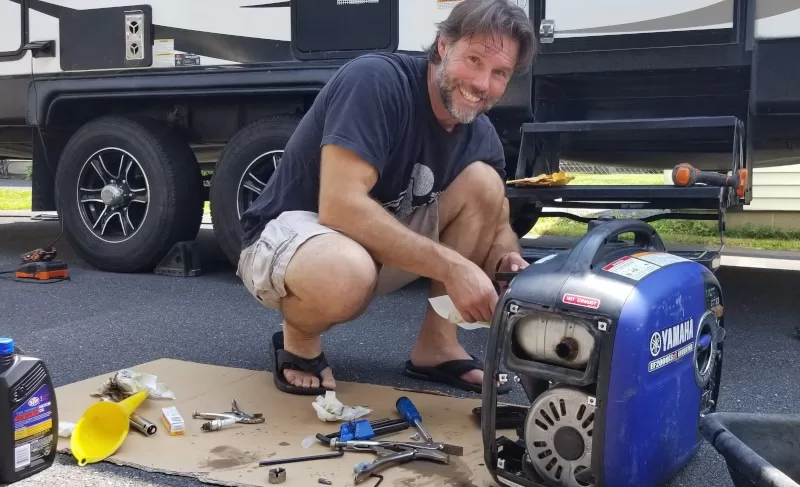
Preventative maintenance is easy with the Yamaha generator.
If you want to power high-watt appliances, you’ll need two. But they’re easy to set up in parallel in order to obtain 30 amps.
Comparable Features
Touted as the most reliable, the Honda generator is also one of the quietest generators. Of all the RV owners we’ve encountered boondocking, this was the most popular of the smaller units.
At no point, did any full-time RVers have anything negative to say about the Honda generator. Although, I have heard some complaints about the price.
To each is own when it comes to the price.
Keep in mind, if you want to power high-watt appliances, you’ll need two. But they’re also easy to set up in parallel in order to obtain 30 amps.
Comparable Features
We had a Generac whole house generator in our sticks and bricks house and it always functioned well and was reliable.
The parallel kit for this generator is more complicated than some of the others. The less you have to store and transport, the better.
You will still need two run in parallel to power most kitchen appliances and air conditioning.
Comparable Features
We spent close to four weeks boondocking on some friend’s land (where they also boondock their fifth-wheel) and they powered their rig with one of these.
They had nothing but good things to say and it worked great for their needs.
Briggs & Stratton has a long history of dependable engines. You, like myself, have probably tuned up an old Briggs & Stratton lawn mower engine.
Again, you will need two run in parallel to power most kitchen appliances and air conditioning.
Comparable Features
Westinghouse has a history of quality products, including generators. This is a less popular generator. At least from what I’ve noticed boondocking.
It is one of the quietest listed, which is important when you’re trying not to disrupt nature.
Like the others, you will need two run in parallel to power most kitchen appliances and air conditioning.
Comparable Features
I’m less familiar with Champion generators, but I sure do see a lot of them by RV’s on BLM land.
If they were not reliable, experienced RVers would not buy them.
This is also one of the only dual-fuel options if you prefer the option to use propane.
You will still need two run in parallel to power most kitchen appliances and air conditioning.
Comparable Features
Note that your running amps drop from 15.4 on gasoline to 13.9 on propane. Propane might not be the best option as a fuel source if you need a steady 15 amps.
Not Sure What You Need For Your RV?
Lithium Power Bank For Boondocking
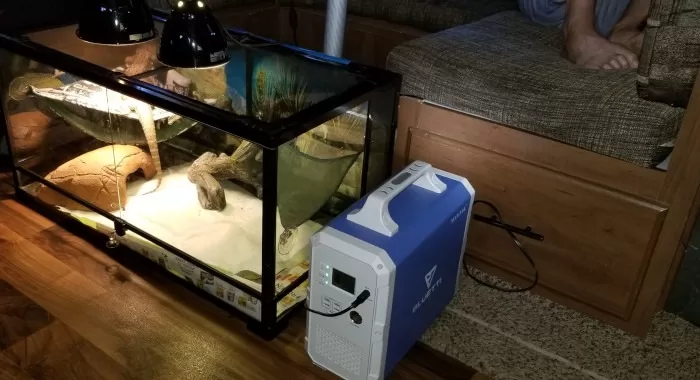
Some people refer to this as a solar generatoras a source of clean energy.
We have a Bluetti which we used to run our heat emitter for our bearded dragon overnight.
Lithium power stations are a good supplement to any generator if you have the funds. Can you power your RV with a solar generator?
Kind of. I tried plugging the whole camper into the power bank with a 15 amp converter and it powered everything except the RV air conditioner.
But even with 200 amp hours, the solar generator would not have run the power in the travel trailer for long.
Even the best solar generators can not keep up with the power needs of most RVs.
Again, it’s a nice supplement for additional power.
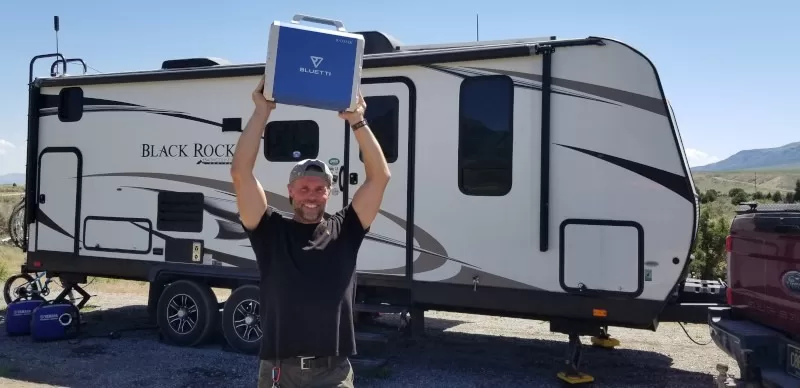
Here’s the newer version of the one we use:
Wrapping Up Portable RV Generator For Boondocking

Boondocking in beautiful Colorado!
The best portable generator is the one you can lift and will power your RV adequately while you’re boondocking.
All of the brands I reviewed are well respected and have a solid track record. Buying an off-brand generator may not be wise if you’re living full-time in an RV.
Although, if you’re a weekend warrior, you can be a little less selective with brands.
Besides, having one on hand for power outages or emergency situations is a good thing.
If I had to start over, I’d eye the Generac 8250 GP2500i. It has a long run-time and produces a higher running wattage.
It doesn’t take one long to saturate the circuit that is powered by approximately 2000 Watts with all of our power-hungry “stuff!”
Those of you with built-in generators, consider yourself lucky!
What kind of portable generator do you use to boondock?
Meet the author.
We appreciate any help we can get to bring you great content. Donate or buy us a coffee on our Ko-Fi site.


